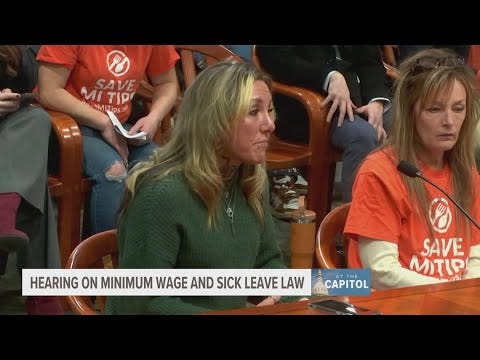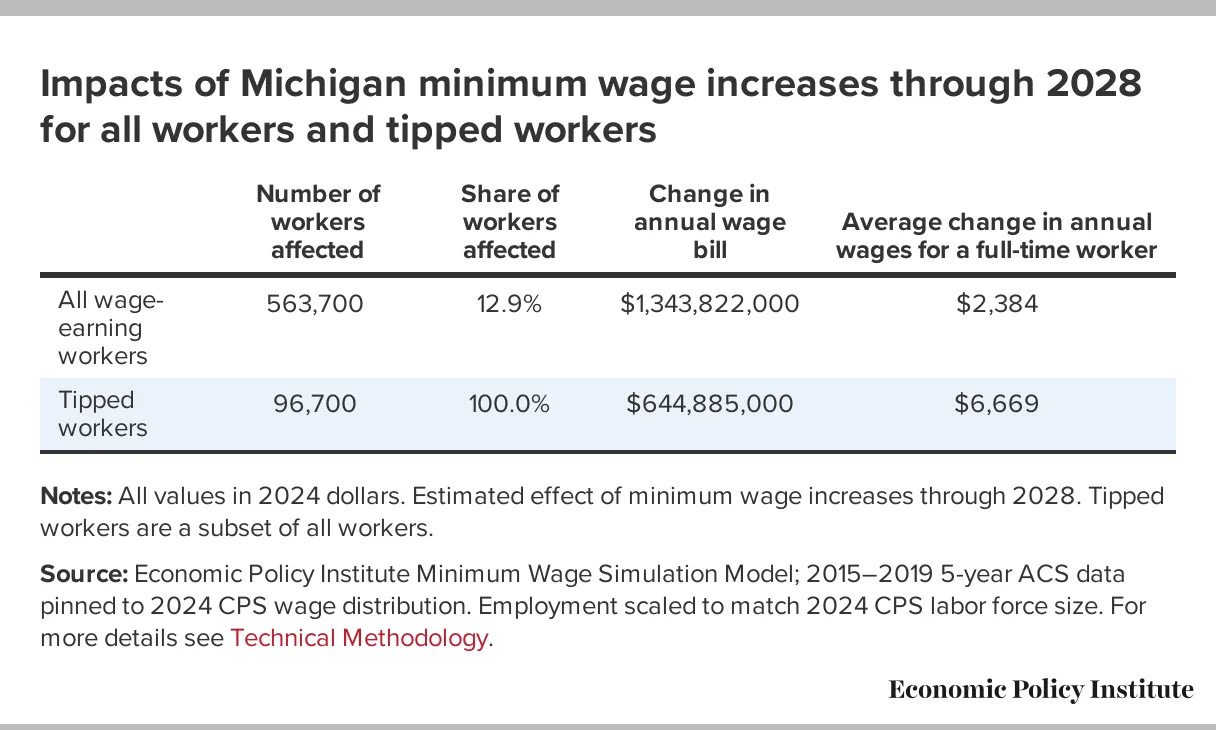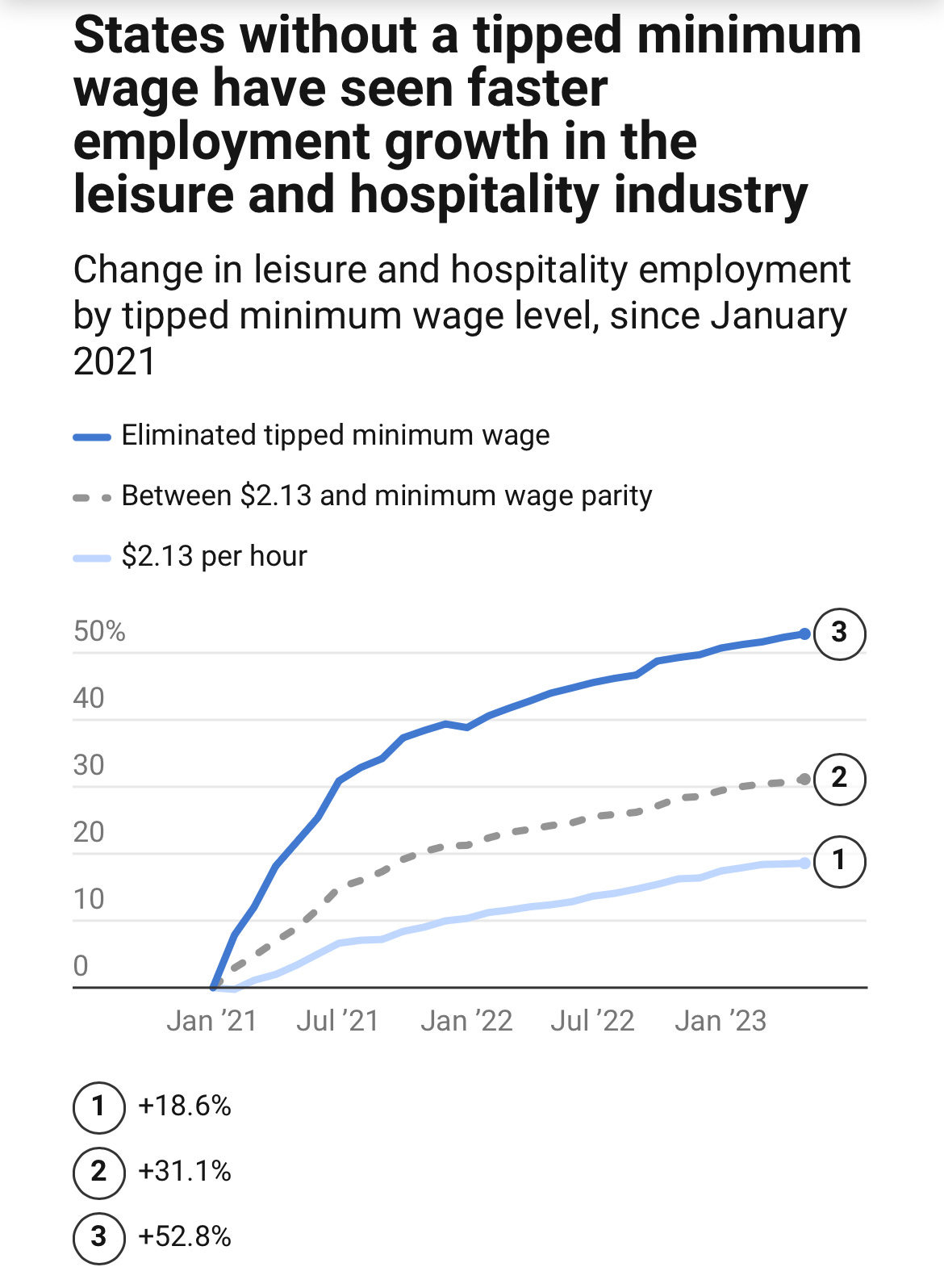Why are some Democrats voting to lower the minimum wage?
Sabotaging working people — and themselves — in Michigan
Welcome to a Sunday edition of Progress Report.
Well, we’re a day away from the official start of Donald Trump’s second term as president, though he has more or less been the de facto national strongman for the past month or so. The TikTok charade felt like something out of pro wrestling, Trump’s new meme-coin scheme to rip millions of Americans off right before his inauguration, and the chaos that is about to unfold with little pushback — it all feels as if nobody is even trying to stop the guy.
I’ve got a lot of thoughts on what comes next, as well as updates on news stories we’ve been following, and I’ll be sending those things out tomorrow. Tonight, we’re looking at a high stakes battle going down in the Midwest that could determine the financial futures of millions of people and the electoral fate of Democrats in perhaps the most politically indicative swing state in the nation.
If it seems like funny timing that I’m talking about it now, I’d argue that it’s actually the perfect time to do it. Trump exists to monopolize attention, while the conservative movement has amassed power over the past five decades by quietly winning policy fights and public opinion at the state and local level. Instead chasing every new inanity that comes out of his mouth, I want to make sure that this newsletter stays focused on ways to build power and help people both now and in the long-term.
Note: This is a fully independent newsletter — no ads, no sponsors, no politicians able to apply pressure or influence what we cover and write. Progress Report relies entirely on readers and supporters willing to fund independent journalism and political thought.
This election showed that progressives desperately need to build up their own alternative political media infrastructure, and for just $5 a month, you can help keep us afloat and build the movement.
A new poll from CNN released on Sunday found that just a third of Americans have a positive opinion about the Democratic Party, an all-time low that reinforces the urgency of reconnecting with working class voters — especially in the one-time “blue wall” Midwestern states that tipped red again. So it only makes sense that some Democrats in Michigan, where organized labor maintains more influence than in any other state, voted to lower the minimum wage and reduce the number of workers eligible for paid sick days.
Wait, what?
You didn’t misread: A new House select committee on Wednesday approved a pair of bills that severely water down long-awaited boosts to pay and benefits for low wage workers in Michigan, setting up a full floor vote in next week. All but one of the Democrats on the brand new, mildly Orwellian-named Select Committee Protecting Michigan Employees and Small Businesses voted for both bills.
The messy background
What’s happening in Michigan right now is something of an unprecedented situation, and the culmination of a fight that has spanned seven years and several political lifetimes.
It began back in 2018, when activists collected nearly 300,000 signatures for a ballot initiative to gradually raise the minimum wage and ensure that workers could accrue paid sick time from employers. Specifically, it would have:
Raised the minimum wage from $9.25 to $12 in 2022, then indexed it to inflation;
Phased out the sub-minimum for tipped workers, from 38% to parity in 2024;
Required businesses with fewer than 10 employees to offer up to 40 hours of paid sick leave and 32 hours of unpaid leave;
Required businesses with 10+ employees to offer 72 hours of paid sick leave.
These were huge improvements and would have been a game-changer for millions of workers. Similar initiatives passed in a number of states that year (and in subsequent elections), but in Michigan, a legal quirk gave the Republican majority the ability to adopt it into law before it ever went before voters, with a catch.
Republicans adopted the law and pretended to have no ulterior motives, but after Democrats swept them out of power in November, the outgoing majority passed an amendment that essentially gutted the new wage and sick leave law. They set the minimum wage increase to a crawl, pushing the $12 mark to 2030, killed the sub-minimum phase-out, and excluded most workers from paid leave.
Democrats flipped the state Supreme Court in 2020, and soon after, advocates filed a lawsuit over that final middle finger to working Michiganders. Their patience paid off, as the high court ruled this past August that the “adopt and amend” maneuver used to gut the initiative violated the state constitution.
To mimic the trajectory outlined in the initiative, the court ordered in August that Michigan raise its minimum wage every year until it hits nearly $15 in 2028 and phase out the tipped wage. Democratic justices also restored the paid sick leave.
The remedies, which go into effect on February 21st, were so offensive to House Republicans that they boycotted most of the December lame duck session because they couldn’t repeal them.
Now that they control the chamber, they’re going all-out to pump the breaks on progress, and the Democrats on their bespoke committee are going along with them.
Parsing the economic impact
Depending on who you ask, the state Supreme Court’s decision going into effect unaltered would either be a huge boon or total disaster for workers and businesses in Michigan.
This fall, the Economic Policy Institute put out a study that projected that more than 563,000 workers in Michigan — or just about 13% of the state’s workforce — would take home over $1.3 billion in additional wages each year, good for a $2,200 annual raise. The impact would be even more substantial for nearly 100,000 tipped workers, who would pocket $6,669 more per year. This would be a particular boost for women and people of color who currently live on tips, as they tend to make far less than white men who work in the service industry.
The EPI also projected that an astonishing 1.5 million workers would gain access to paid sick leave if the changes went into effect.
On the other hand, the Michigan Restaurant and Lodging Association this winter produced a member survey that claimed that pay raises and sick leave requirements, as currently designed, would lead to the loss of between 40,000 and 60,000 restaurant jobs.
So who is correct? As Monique Stanton, the president and CEO of the Michigan League of Public Policy told me on Friday, historic data does not support the catastrophizing being done by the industry lobby.
“States that didn’t have a sub-minimum wage recovered more quickly from the pandemic,” Stanton pointed out. “Those states did not lose one-fifth of their restaurants.”
The follow-up was a pointed reference to another apocryphal prediction put out by the Restaurant and Lodging Association. How the group determined that number is unclear, but also belied by recent history.
In late 2023, a study by the Center for American Progress found that the then-seven states without a lower tipped minimum wage experienced much more robust post-pandemic job recovery in the leisure and entertainment sector, which include restaurants, bars, and other relevant workplaces.
In Washington, DC, the phase-out of the tipped minimum wage began after a successful ballot initiative in 2022, and as of October, job growth in the restaurant industry was largely flat, with soaring rents also causing a problem for operators.
States with what are considered higher overall minimum wages have also experienced much faster job recovery, and in California, the fast food sector’s new $20 minimum wage has not led to any net job loss.
The unique and messy politics
Republicans gave industry representatives and some highly compensated servers several hours to hammer away at their apocalyptic warnings during a high profile hearing at the capital last week.
The servers who testified all said that changing the law would disincentivize tips, which provide them very handsome livings. Such workers are staples of state and local debates over ending the sub-minimum wage, and they frequently make headlines, but Stanton says those stories are largely anecdotal.
“At the hearing, a lot of people were saying they were making six figures in tipped wages, but the average tipped wage for workers in Michigan is $17.02,” she explained. “In states without the tipped wage, take home pay is typically 21% higher.”
The testimony did the trick, though, as the select committee passed a pair of bills that take a hatchet to two of the three major provisions.
HB 4001 pushes back the phase-in to the $15 minimum wage by a year and keeps the sub-minimum at a lowly 38% altogether. Instead of jumping up to $6 at the end of February, the tipped wage would stay at $4.01 and never exceed $5.70.
(While restaurant operators are supposed to make up the difference if workers don’t wind up making at least the regular minimum wage with tips, rampant wage theft means that it often does not happen.)
The select committee’s companion bill, HB 4002, exempts all businesses with fewer than 50 employees — or more than 96% of businesses in Michigan — from having to provide any paid sick leave whatsoever.
There was not a single Democratic vote against either bill, with Rep. Tyrone Carter’s abstaining from the vote on the minimum wage bill representing the only mild dissent.
The lawmaker, who represents part of Detroit, told me in a call on Friday that he backed the change to paid sick leave because the federal Family and Medical Leave Act (FMLA) — which mandates unpaid leave — also applies to businesses with 50 or more employees.
While a handful of states have made paid leave access mandatory for businesses with a single employee, and Wisconsin is the only one that limits it to such large workplaces, Carter said that he was concerned that anything more stringent would disincentivize growth and cause staffing chaos.
Carter was the only Democratic member of the select committee to agree to speak with me on Friday, which comes as no surprise — I’m told that the minority party had no input into who was chosen to sit on the committee. The roster is thus filled largely with Democrats who have either been caught up in financial scandal or are known for bucking their own party and making things politically difficult.
That’s precisely what they did with the vote this week, providing Democratic support to and partially neutralizing partisan attacks on a bad bill that was never going to become law in this form.
What comes next?
Democrats still control the state Senate and governor’s mansion, and as one person close to the caucus told me, the GOP plan, even once it passes the full House, will be “dead on arrival.” Senate Democrats are instead working on their own adjustment bill — a complicated situation on its own — and the House select committee members could have used that as leverage to get better terms.
“There is room to work on the tip credit and sick leave but they're just willing to blow all negotiating space to signal to their corporate friends that they're obedient or something,” the source told me.
The Senate bill would move the $15 minimum up a year, to 2027, while allowing the tipped wage to gradually hit 60% but go no further. The sick time threshold would have the same set-up as the pending law, but increase the employee threshold from 10 to 25. There’s also little urgency to get it doe o the Senate side. Why they’d pursue this at all is hard to fathom; given the state’s mediocre job creation and the deep importance of workers rights in Michigan, is baffling.
Compare the pending policy to what’s happened to wages and time off in other states makes it even more confusing. In Nebraska, a ballot initiative to require paid sick leave won 75% of voters in November, while an initiative that added both a minimum wage increase and paid leave won 58% of voters in Missouri. Neither initiative has as big an escape clause for employers, and Missouri’s bill has the wage hitting $15 in 2026.
It goes without saying that both states are far, far more conservative than Michigan, with labor union infrastructure that are comparatively non-existent. It’s hard to fathom why Democrats are pushing hard to attack upwards of a million working people, stripping them of some or all of new raises and benefits when they’re so close that they can taste them, all to please a business lobby that always supports their political opponents.
This congenital need to seem like the “serious” ones has continually hobbled Democrats, who get shown up and have their policies obliterated with something far worse. Labor and pro-worker nonprofits will be pushing hard to scupper the wage sabotage, and in Michigan of all places, the party ought to listen.
Wait, Before You Leave!
Progress Report has raised over $7 million dollars for progressive candidates and causes, breaks national stories about corrupt politicians, and delivers incisive analysis, and goes deep into the grassroots.
None of the money we’ve raised for candidates and causes goes to producing this newsletter or all of the related projects we put out. In fact, it costs me money to do this. So, I need your help.
For just $5 a month, you can buy a premium subscription that includes:
Premium member-only newsletters with original reporting
Financing new projects and paying new reporters
Access to upcoming chats and live notes
You can also make a one-time donation to Progress Report’s GoFundMe campaign — doing so will earn you a shout-out in the next weekend edition of the newsletter!








Thank you for avoiding the GOP glitter-ball of scare tactics and disinformation and giving us information that is valuable. I didn't realize MI wasn't a trifecta state, and to see the Dem state legislators take away benefits--willingly, and without a fight-- that voters had previously approved of is appalling. It is difficult enough for progressive legislation to get passed by Democrats, but to see them actively work at tearing it down is one of the most depressing things I have read in a while. I wish you had given us the names of the legislators involved...I would happily donate against them in the future.
I am for one profoundly disappointed in the Democratic Party who seems more and more a collection of Blue dog Dems who care nothing at all about workers while just like Republicans, they seek to satisfy their donors above all.
I guess, those Dems still have not figured out how they could possibly have lost to Felon Dump, so perhaps we should tell them why:
Dems, you betrayed blue collar workers. You called them "the uneducated", or the "Low Education voter", or like Hillary Clinton made remarks like: "Who else are they going to vote for?"
Well, now you know. they told you:
They are sick and tired of being on a constant austerity budget while they are seeing corrupt billionaires escape even a slap on the wrist when they misbehave "bigly".
A career in politics, these days is only a means of getting rich, taking bribes from a barely hidden pay to play stratagem: Look at every Congressman and woman: their wealth has doubled and tripled since they've been in Congress. Look at them all: They are like pigs at the trough:
https://www.investopedia.com/articles/markets/080416/how-congress-retirement-pay-compares-overall-average.asp
This state of austerity has been in vigor since the "Trickle Down Economy" caper came into effect. What even George Bush called "Voo-Doo economics".